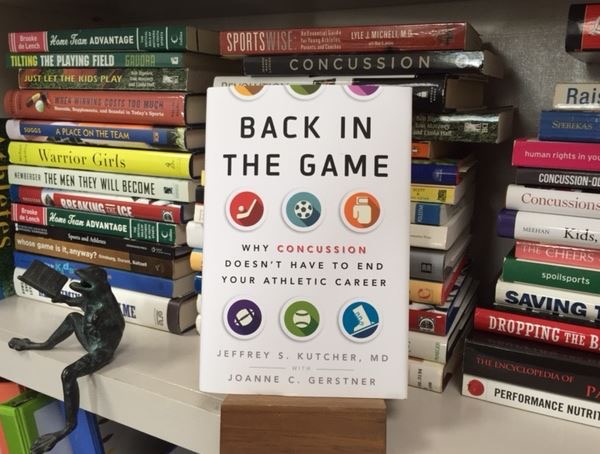“Back in the Game”: A Concussion Book That Stands Out In Crowded Field
The advice Kutcher and Gerstner provide to parents and coaches, much of it from former elite athletes who are now standing on the sports sidelines as parents, is solid and grounded on common sense. Parents, they say correctly, need to recognize that their child’s coaches are not like professional or elite coaches, that most are unpaid volunteers, and that many may not know more about concussions than they do. They advise that if parents see something that looks dangerous or not totally right, they need to speak up, perhaps not directly to the coach, but through proper channels, such as the booster club, athletic director, parent representatives, or athletic trainers.
As for coaches, they admit that they have to “walk a fine line between advocating toughness and discipline during play and leading athletes to believe they should play through injury and pain,” and that, while concussion awareness has improved, there is still a great deal of resistance to changing the “warrior mentality” common to many contact and collision sports.
Like the advice we advance in the concussion education game plan developed under our Mind Matters Challenge grant from the NCAA and Department of Defense, Kutcher and Gerstner take the view that: anything short of athletes being totally responsible and accountable about their brain health is unacceptable; that coaches and the athletic training staff need to communicate from the start of the season the message that there “is no heroism or credit given for playing through a concussion” but that “it’s unwise, it’s dangerous” and will not be tolerated; and that mandated concussion education of players, coaches, parents, and leagues – a position MomsTEAM has advocated for a decade – would do a lot to make contact sports safer
The penultimate chapter (“Changing the Game: On and Off The Field”) provides a useful, if familiar (at least to MomsTEAM followers), summary about protective equipment (helmets and mouth guards), warnings against the use of impact sensors and baseline testing in diagnosing concussions), and short, somewhat perfunctory discussions about innovative training techniques (“heads up”, helmetless tackling etc.), strength training, proper hydration, and rules enforcement in reducing concussion risk.
If the book seems to be losing steam at this point, Kutcher and Gerstner end it on a high note, returning one last time to a discussion of the outsized influence the media has had, and continues to play, in the messaging about concussion.
Regardless of whether the early sports concussion landscape is seen as being defined by the 2009 New York Times article headlined, “Dementia Risk Seen in Players in NFL Study”, as Kutcher and Gerstner argue, or the 2007 Times article, “Expert Ties Ex-Player’s Suicide To Brain Damage,” as Jean Marie Laskas argues in her outstanding book, Concussion, the influence of messaging in the discussion about head injuries in sports is a constant.
The reality, as they point out, is that the “multitude of voices across the different media formats, speaking about sports and concussion, whether it is a sports fan with no medical knowledge on Twitter, a former NFL player doing color commentary on ESPN, a sportswriter with Sports Illustrated, or even a TMZ tabloid reporter, all lend to a confusing cacophony. But the idea is always the same: driving traffic, gaining a following, and if a business, making money.”



